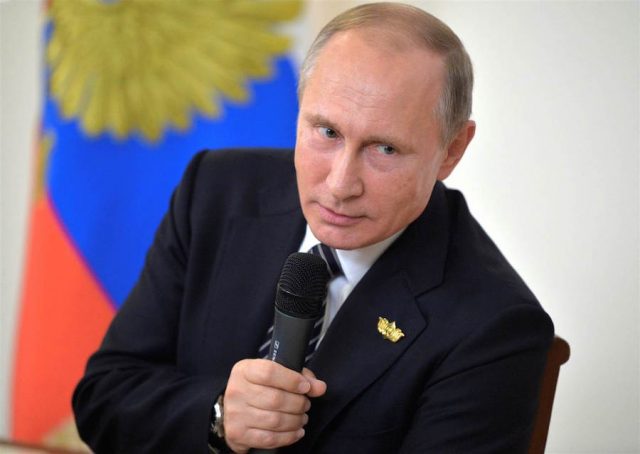This past week brought news that the Trump White House had taken its first military action, just 77 days into the new administration. On April 4th, U.S. forces rained 59 Tomahawk cruise missiles down on a Syrian airfield, reportedly the source of the brutal chemical weapons attack against civilians in the Idlib province. (To be clear, we have been continually bombing Isis targets inside Syria since 2014, but this attack is the first to target the Assad regime.)

Donald Trump, The Embattled American President
The American press has been resounding in its approval of the bombing; unquestionably, the Syrian attack has been the most popular action the new president has taken since assuming office. Likewise, a few grumblings about “process” aside, the congress has been united in its support of the Syrian strike. Nancy Pelosi said the strike “appears to be a proportional response to the regime’s use of chemical weapons,” while Chuck Schumer went even further: “Making sure Assad knows that when he commits such despicable atrocities he will pay a price is the right thing to do,” he said in a statement. Even diehard Trump foes Hillary Clinton and John McCain had positive things to say about Trump’s military action against the Assad government.
This is jarring, particularly against the background of the last few months, and it gets me wondering. First, about the chemical weapons attack itself. The source of the attack is being debated in capitals across the world; Canadian Prime Minister Trudeau publicly called for an investigation into the identity of the perpetrators, saying “there are continuing questions….about who is responsible for these horrible attacks.” Now there are reports that the Kremlin knew about the chemical attack ahead of time, and that we are actively investigating possible Russian involvement.

Russian President Vladimir Putin, Seemingly About To Break Into Song
Both Washington and Moscow have been talking tough since the bombing, with Putin saying the US-Russian relationship has “deteriorated” under Trump. The narrative that we are being fed is clear: forced to respond to horrible reports of the use of chemical weapons against civilians, Trump stood up to Putin and attacked Syria, Russia’s client state. As a result, tensions between the two powers are at their highest level in years.
There are just a few problems with this narrative.
One, we attacked the Syrian airfield on April 6th, but it was several days later before we called for an investigation into who was responsible. What? Six children were killed in these attacks. And now we are asking about Russia’s involvement? Yes, a drone did circle the hospital where drone victims were being treated, and a plane returned 5 hours later to destroy the hospital (and presumably, physical evidence of the attacks–that is, the victims themselves). That’s pretty suspicious, we’re now told; we ought to look into this. That’s six dead kids later. And please, don’t tell me about chemical weapons again: a dead child is a dead child.
Sure, if you watched the U.S. news media in the days between the sarin attack and Trump’s response, you’d conclude the case had already been proven. The tone of the coverage was decisive, and the Assad regime was tried and convicted in the media for the attacks before Trump ever pulled the trigger on the cruise missiles.
Why is that? The same reason that the establishment uniformly hated Donald Trump–before he launched 59 cruise missiles, of course (and now, the MOAB). Because there is only one truly unforgivable sin for a U.S. president: pacifism.
When Trump came into office, he was an active threat to what we used to call the Military Industrial Complex. These days, we call it the American economy: over half of our discretionary spending goes to the military every single year. That came to just over $600 billion in 2015. This is during peacetime, mind you.
So when Trump campaigned on reducing foreign military entanglements, and then appeared to be cozying up to Russia (our most historically convenient boogeyman, one the news media has been actively reviving since its loss of Hugo Chavez), he upset a lot of very important people. Namely, the people who stand to make sizable chunks of that $600 billion. Admittedly, that’s a big Easter table: benefactors of military spending go way beyond defense contractors to include big banks, tech firms….and our venerable congress, of course.
Think about it: this explains the orthodox rejection of Trump as a candidate (and later, as president) better than his inexperience, obvious sexism, or racist overtones ever did. We’ve had every sort of crook and buffoon in the oval office over the years (remember George W?), and we’ve never seen such a blanket rejection of a chief executive. But alas! That no longer matters. Blood has been spilled in the name of American commerce freedom, and all is forgiven.
The war machine in this country is more finely tuned and well-oiled than ever. Nearly every branch of it has been fattened by decades of flowing billions, after all. With the able assistance of the obeisant American corporate media, they manufacture foreign enemies with the practiced hand of advertising executives. And they will brook no discussion of any real long-term peace, not so long as that peace threatens their ever-inflating budgets.
This tendency also explains the news media’s rush to judgment on the Russiagate allegations. Granted, there does appear to be evidence of inappropriate contact between the Trump campaign and Russian officials. Likewise, we’ve been told that the Russians actually hacked our election.
But, let’s back up for just a second. While alarming, these charges are still under investigation, and have not yet been proven–or things would be a lot different for the Trump administration right now, clearly.

Syrian President Bashar al-Assad: Homicidal Monster, Or Merely Today’s Scapegoat?
So, why has the tone of the media coverage been so conclusive? Because for the military establishment and the intelligence community that serves them, Russiagate was two birds with one stone: it further demonized Putin, our ogre-of-the-moment; and it helped them discredit Trump, a candidate they despised.
And even if the Russiagate reports are true, they are nothing particularly new. Russia has been interfering with our politics for decades, and we with theirs. The difference is, we typically don’t stop there. When an election doesn’t turn out the way we want it, it’s never good news for the new regime, wherever in the world the unfortunates may be. Our record of deposing (or assassinating) leaders we dislike is exhaustive, and Russia has never really competed with us in this regard.
The primacy of military spending is the true third rail in American politics: there is no flying in the face of this power without retaliation. Trump found this out quickly, and it appears he has learned what it takes to be popular in the distorted ecosystem of our republic.
On Wednesday, Russia voted in the Security Council to block a UN probe into the Syrian chemical weapon attacks. Whatever their role in the attacks, we are now a lot less likely to get to the bottom of it. Perhaps the most ominous aspect of all of this: the likelihood that the attack was coordinated by the Russians in order to assist Trump. A bridge too far? I think not.
Again, consider the benefits: the attack on Syria gave Trump the chance to look tough on the international stage–and we’ve already seen how effective it was domestically. Conveniently, it also set the U.S. (ostensibly) at odds with the Russians, throwing water on all the reports of collusion between Trump’s administration and the Kremlin. (And it isn’t as if Syria had any real say in this: if Putin needed a scapegoat here, Assad has no illusions about who he works for.)
So this is the question: are world affairs now being stage managed by two superpowers, with leaders who merely pretend to be at odds, using military action as just another tool to manipulate the media and public opinion?
Our naval forces steam towards international waters off of the Korean peninsula as we speak.